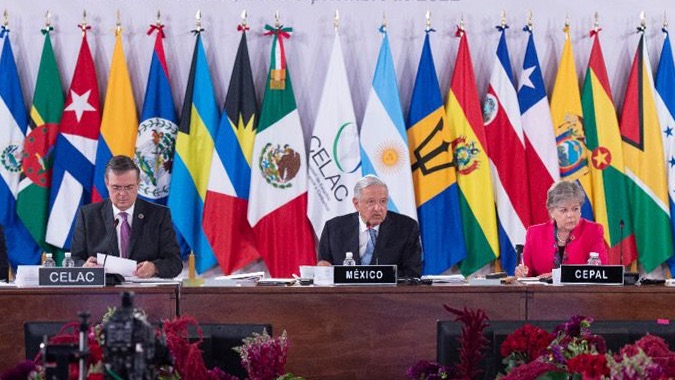Forging a Secure Future: Strengthening Security Cooperation in the Americas
The interconnected nature of the 21st century presents unprecedented challenges to the security and stability of North and South America. Transnational threats, ranging from terrorism and organized crime to cyberattacks and environmental degradation, transcend national borders, demanding a unified and collaborative response. This article explores the critical need for enhanced security cooperation across the Americas, highlighting key areas for collaboration and emphasizing the importance of a holistic, multi-faceted approach.
Combating Terrorism: A Shared Responsibility
Terrorism's borderless nature necessitates a robust exchange of intelligence and coordinated counter-terrorism strategies among North and South American nations. Joint operations, preventative measures, and the sharing of best practices are crucial to neutralizing this persistent threat and safeguarding our shared security.
Disrupting Transnational Criminal Networks
Organized crime syndicates exploit vulnerabilities in national legal frameworks, demanding international collaboration. Information sharing, strengthened border security, and joint law enforcement initiatives are vital for dismantling these networks and disrupting their illicit activities. This requires a commitment to capacity building and resource sharing among nations of varying capabilities.
Securing the Digital Frontier: A Collaborative Cybersecurity Approach
The digital landscape presents a new battlefield for cybercriminals and state-sponsored actors. Building robust cybersecurity frameworks, sharing threat intelligence, and conducting joint cyber exercises are paramount to enhancing collective resilience against cyber threats. Investing in cybersecurity education and training programs for professionals across the Americas is a critical component of this strategy.
Addressing the Drug Trafficking Crisis: A Regional Approach
The Americas remain a primary transit route for illicit drugs, leading to devastating social and economic consequences. Cooperative efforts to disrupt drug trafficking networks, enhance interdiction strategies, and support drug rehabilitation and prevention programs are essential to combating this multifaceted issue. This requires a balance of law enforcement and social programs to address both supply and demand.
Protecting Vulnerable Populations: Addressing Migration and Human Trafficking
The complex issue of migration requires a humanitarian and collaborative approach. Cooperation between nations is crucial to combat human trafficking, protect the rights of migrants, and address the root causes of migration, ensuring the well-being of vulnerable individuals throughout their journeys.
Environmental Security: A Shared Responsibility for a Sustainable Future
Climate change, deforestation, and natural disasters pose significant threats to both environmental sustainability and human security. Strengthening disaster response mechanisms, fostering sustainable development practices, and protecting shared natural resources necessitate close collaboration across the Americas.
Strengthening Border Security: Collaborative Strategies for Enhanced Protection
Effective border management, involving intelligence sharing, joint patrols, and the deployment of advanced technologies, is critical to combating cross-border threats such as arms trafficking and smuggling. This necessitates investment in modern border infrastructure and technology, coupled with robust training programs for border security personnel.
Enhancing Defense Cooperation: Building Regional Stability
Joint military exercises, training programs, and the exchange of defense technologies contribute significantly to regional stability and deterrence. This collaborative approach enhances preparedness for potential threats and promotes interoperability among defense forces.
The Power of Intelligence Sharing: The Cornerstone of Effective Security Cooperation
Timely and accurate intelligence sharing is fundamental to effective security cooperation. Establishing secure communication channels and promoting collaboration among intelligence agencies are vital for enhancing our collective ability to preempt and respond to transnational threats.
Leveraging Regional Institutions: Fostering Collaboration and Coordination
Regional institutions, such as the Organization of American States (OAS), provide essential platforms for dialogue, coordination, and the development of shared strategies to address security challenges. Strengthening these institutions and empowering them to act effectively is crucial.
Public-Private Partnerships: Harnessing Innovation and Expertise
Involving the private sector leverages its expertise, resources, and innovative solutions to enhance the effectiveness of security cooperation efforts. This collaboration fosters a more comprehensive and adaptable approach to addressing transnational threats.
Building Bridges Through Cultural Exchange: Fostering Understanding and Trust
Cultural exchange programs promote mutual understanding and trust among nations, paving the way for more effective collaboration on security matters. This people-to-people diplomacy strengthens bonds and lays the groundwork for lasting partnerships.
Investing in Education and Training: Equipping Future Leaders
Investment in education and training programs focused on contemporary security challenges equips individuals with the skills and knowledge needed to contribute effectively to regional security initiatives. This focus on human capital development is essential for long-term success.
The Importance of Diplomatic Engagement: Building Trust and Collaboration
Diplomatic dialogue and negotiations are crucial for resolving conflicts, building trust, and fostering stronger cooperation among North and South American nations. This proactive approach prevents escalation and builds a foundation for mutual understanding.
Engaging Civil Society: Promoting Transparency and Inclusivity
Involving civil society organizations brings diverse perspectives, promotes transparency, and ensures that security initiatives reflect the interests and needs of all stakeholders. This inclusive approach fosters greater public trust and support for security cooperation.
Conclusion: A Collective Commitment to a Secure Future
Addressing transnational threats demands a collective, collaborative, and comprehensive approach. By prioritizing security cooperation and embracing a multi-faceted strategy, North and South American nations can build a safer, more prosperous, and secure future for all citizens. The time for decisive action is now. Let us work together to build a safer and more prosperous Americas for generations to come.


